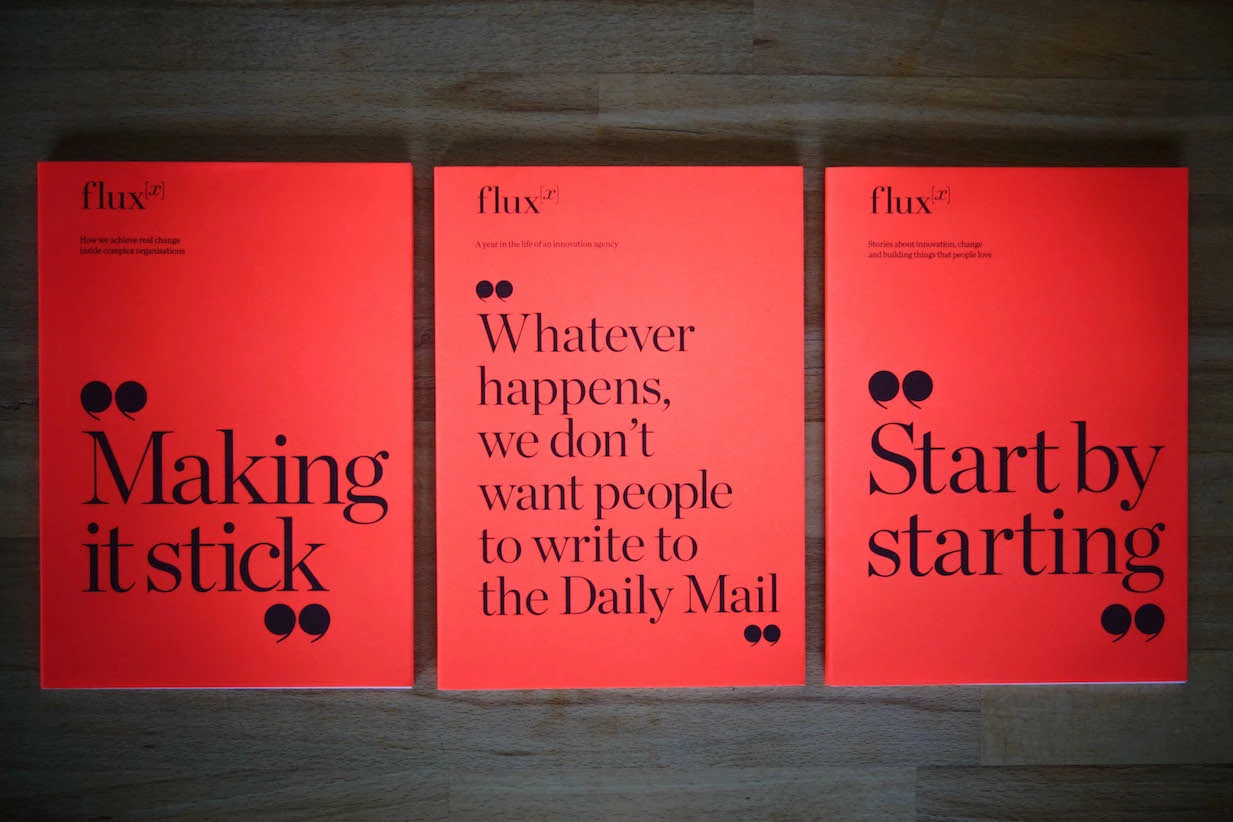
Partner Article
From doggy treats to fake chat-bots, this new book is the antidote to boring business theory
“Whatever happens, we don’t want people to write to the Daily Mail“
Huge business change has to start somewhere. A new book from the team at Fluxx: “Whatever happens, we don’t want people to write to the Daily Mail” aims to show hungry business people how to quickly unlock potential and reinvent a business – with a ‘test and learn’ approach to new ideas and projects.
Fluxx is a London-based business experiment consultancy, and has delivered the antidote to complex business theory. Its fascinating collection of stories, tips and advice gives a look behind the scenes of some of the most effective business experiments carried out.
Read anecdotes from the Fluxx team, doing anything from choosing dog treats to pretending to be a ticket machine or a chat-bot. The book explains how quick experiments can turn into successful new products, and even reinvent the way an entire business works.
For this new book, Fluxx calls on a bank of knowledge gained from working with everyone from Lloyds Bank, GAME, More Than and William Hill to the UK Parliament.
Richard Poole, managing partner at Fluxx explains: “Ideas arrive as a pitch; a PowerPoint deck selling a dream accompanied by a spreadsheet filled with hopeful numbers. Leaders have to make decisions about these ideas before anything has been built.
“Often ideas live as pitches for years, some become projects. Budgets are attached, staff are hired, plans are drawn up. Eventually, the product is launched and exposed to the real world for the first time. Sometimes, this is a shock. The real world is messy and confusing. Customers don’t do what they said they’d do in focus groups.
“We learned the idea of lean business experiments from start-ups that have successfully scaled up. Someone bootstrapping an idea from their kitchen table can’t afford to waste time or money on ideas that are unlikely to succeed.” Four types of Fluxx experiment featured in the book:
- Wizard of Oz: to the customer, it looks like an all singing all dancing product. Behind the scenes it’s held together with manual labour. That cool chat-bot? Really a human being. This works well when the service will rely on complex automation or an elaborate supply chain.
- Fake Door: use advertising, websites or videos to explain your proposition before you create a real service. Ask customers to commit in some way, for example by signing up for a newsletter or giving a deposit. This is an effective way of gauging market desirability with little effort, and powers services like Kickstarter.
- Lookalike: Use existing tools to simulate the service that you plan to provide. Create something that is as close to the service you envision as you can get using whatever tools you can find. Sometimes, even rebranding a competitor’s product can help customers understand your idea.
- Popup: Create a handheld, small scale version of your experience for a short period of time. Pop-up experiments are often restricted to people in a local area. While often requiring a lot of effort they provide an opportunity to see exactly how people interact with the product or service.
Read more here in the book - www.fluxx.uk.com/book
** An experiment is more than research – More Than Case Study**
“My dog only eats cheese treats,” said the customer on the phone. She’d just received her first monthly box from Wagglepets, a start-up that Fluxx launched with More Than, the insurance company, and she wasn’t completely happy. The challenge from More Than was to reinvent pet insurance. Instead of being a tax on life, could we turn it into an attractive lifestyle product?
We ran Wagglepets for six months, recruiting 40 customers. It was radically different from a market research project. We saw how customers really reacted to our product, rather than just getting answers to hypothetical questions.
Actionable insights flooded out of the process. We planned to sell one brand of dog food, but ended up with 10. We quickly abandoned Fitbit-style fitness trackers because customers hated the connection with insurance.
Our experiment validated our hypothesis: people would pay for a bundle including food, toys and insurance, and we learnt how to operate the business. By 2017 the experiment was a success, and More Than took the product mainstream under the Doggysentials brand.
Running experiments teaches a novel collection of skills, from a robust understanding of the regulatory and legal context to an intuitive sympathy with customers, ensuring they never feel cheated or manipulated by the experiment.
This was posted in Bdaily's Members' News section by jane devereux .
Enjoy the read? Get Bdaily delivered.
Sign up to receive our popular morning National email for free.








 Navigating the messy middle of business growth
Navigating the messy middle of business growth
 We must make it easier to hire young people
We must make it easier to hire young people
 Why community-based care is key to NHS' future
Why community-based care is key to NHS' future
 Culture, confidence and creativity in the North East
Culture, confidence and creativity in the North East
 Putting in the groundwork to boost skills
Putting in the groundwork to boost skills
 £100,000 milestone drives forward STEM work
£100,000 milestone drives forward STEM work
 Restoring confidence for the economic road ahead
Restoring confidence for the economic road ahead
 Ready to scale? Buy-and-build offers opportunity
Ready to scale? Buy-and-build offers opportunity
 When will our regional economy grow?
When will our regional economy grow?
 Creating a thriving North East construction sector
Creating a thriving North East construction sector
 Why investors are still backing the North East
Why investors are still backing the North East
 Time to stop risking Britain’s family businesses
Time to stop risking Britain’s family businesses